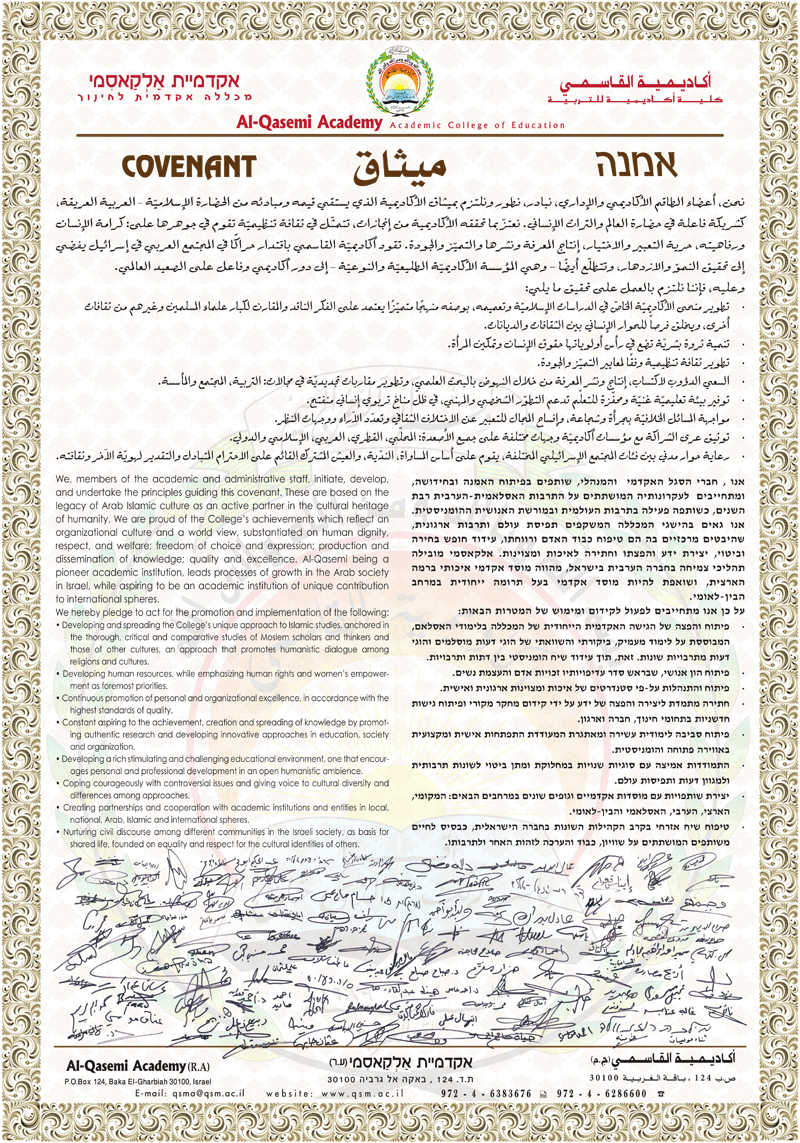Department of English Language and Literature
Institutions of higher education that serve non-native speakers of English are more likely to witness challenges as far as English teaching is concerned. Addressing such challenges professionally and practically, the Department of English Language and Literature at Al-Qasemi College of Education pursues all aspects of its work to foster the understanding of literature, linguistics, and writing as creative practices and cultural enterprises. Our passionate, dedicated and enthusiastic staff members work to promote this understanding in their interaction with students as well as in their undertakings as researchers and scholars. Our department offers a rigorous English Program with a vast array of courses that stimulate critical thinking, diversity and multiculturalism while keeping up with innovations in curricula, pedagogy and the modern-day digital developments.
English majors are required to take courses both in literature and in linguistics in addition to additional mandatory courses imparted by other departments. Going hand in hand with teacher training and consecutive professional development, all courses endorse three spheres: writing, oral, and reading proficiencies. The literature courses open door to the study of classic and contemporary English and American literature of major periods, currents, trends, and authors on such genres as poetry and film and motifs that foster diversity such as multiethnicity and multiculturalism. The linguistics courses deliver a methodical training both in theoretical fields, such as syntax, pragmatics, semantics, and sociolinguistics and in applied and experimental fields, such as language and reading acquisition, error analysis, and discourse analysis in addition to varied writing courses that range from writing proficiency to academic writing.
In the first year, the emphasis is placed on fluency, accuracy, and error analysis so as to boost students’ oral and writing skills. In this respect, students are exposed to a wide range of courses pertaining to theoretical background for English language learning such as Introduction to Linguistics, Oral Proficiency, Written Proficiency, L1 and L2 language Acquisition, Critical Reading and Thinking, Morphology, and Grammar. More, students are offered introductory literature courses that propose varied styles, registers, and different types of texts that expand students’ language awareness and susceptibility to diverse features of English in addition to diverse communities. Examples of such courses are Teaching English Through Films, Survey of American Literature, and Anglophone Literature for Children and Adolescent Readers. Such courses provide students with full and vivid contexts and with varied character patterns from multiple and all-embracing social backgrounds. As such, these courses stimulate students’ views, thoughts, and boost their appreciation to other cultures, customs, and nationalities.
In the second year, students are offered advanced courses that would improve their pronunciation and social interaction skills such as speaking skills, writing skills and reading strategies. Moreover, in Poetic Justice students are exposed to different forms of justice, mercy, punishment, and equity that materialize in the proposed texts. The course also offers them an opportunity to scrutinize literature through the kaleidoscopic lens of various genres while rethinking them from a personal and a local perspective. Examples of second-year courses are Phonetics and Phonology, Theater and Drama, Advanced Grammar, Reading Strategies, Written Expression, Semantics, Oral Proficiency, Syntax, Pragmatics, and Poetic Justice.
In the third year, more attention is paid to literature along with professional oral and writing skills so as to sustain students’ debate and communication skills and promote their higher-order thinking and team-work skills that cater to time management, problem-solving, collaboration, metacognition, and leadership. The literature courses suggested are Multiethnic Literature, Survey of English Literature, from the Anglo-Saxons to the Restoration and Anglo-American Poetry. These courses propose a broad spectrum of multi-cultural and multiethnic texts that foster diversity and inclusion, in addition to enhancing students’ cognizance to other cultures, ethnicities, and minorities. More, the Academic Writing course is designed to elevate students’ writing skills and their awareness to source documentation and the different forms of plagiarism.
Owing to the fact that being a novice teacher is an arduous and a demanding mission, students’ practical knowledge is primarily targeted in their fourth year. In addition to offering the course Survey of English Literature from the Augustan Age to the Contemporary epoch, and a sociolinguistic seminar entitled “Language and Identity,” students are given pedagogical courses where they are equipped with various dexterities that will reinforce their know-how teaching grammar and writing in EFL classrooms.
Simultaneously, as part of their program’s mandatory requirements, students at all levels practice teaching and are integrated in the school system as of the first year. In addition to observing the lessons of their mentors and their fellow students, our students are accompanied by their pedagogical trainers who observe and supervise their teaching methods, constantly giving them guidance, feedback, and advice. Consecutively, these students submit periodic reports to their pedagogical trainers. In these reports the students summarize their progress, their lesson plans, their observations, and the achievements of the work carried out for the relevant period. They are also expected to explore case studies to acquire experience in lesson preparation performance and the process of assessing teaching units.
Tracks:
- High School Track


